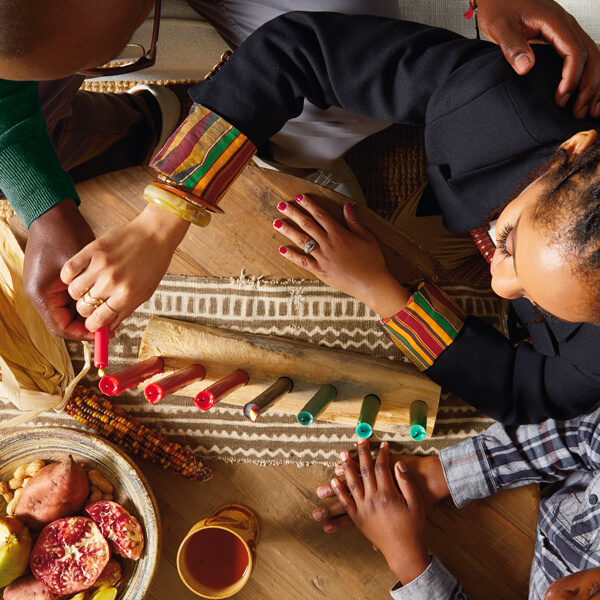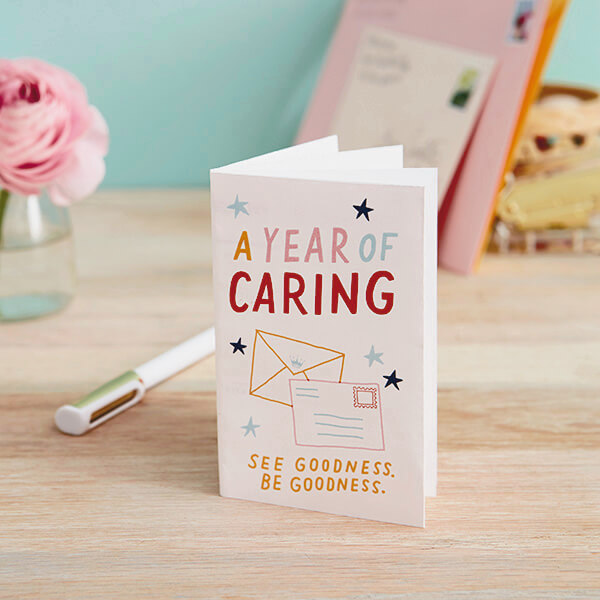How to Support Foster Families

It’s so exciting when someone you know welcomes a child into their lives, whether by birth, adoption, or fostering. You want to celebrate this sweet family, give them your best wishes, and support them in this brand-new chapter of their story. And while you may come across three million baby shower ideas online, you may not have great luck finding ways to assist and celebrate the foster families you know and love.
That’s where we hope to help. Being a good friend to a foster family comes with its own unique considerations, and we’d love to empower you to be amazing at it.
Inspired? Create and share by tagging @HallmarkStores.
Helpful Hints for Supporting Foster Families (Parents and Kids)
Practical help
There are so many ways to be helpful to a family welcoming a child of any age. We’ve got a good list here.
Pro Tip: Rules for who can babysit foster children differ by state and agency. If you’d like to help with childcare, check with the foster parents and do your homework to learn what’s allowed.
Moral support
Being involved with foster care is an emotional journey for everyone—foster parents, biological parents, and children. Recognize that feelings may differ from day to day, and let your friends know you’re there for them through the good times and the challenging times. The best things you can do are listen and affirm their experience. Call, text, and send cards. Check in regularly to show you care.
Foster Family Occasions and Milestones to Recognize
Consider doing something special for:
- Foster parents becoming licensed providers: They’ve put in a lot of work to reach this milestone. Send them a congratulations card or give them a bottle of something to “cheers.”
- Mother’s Day and Father’s Day:
- For foster parents: Send them a card with a special note recognizing what good parents they are.
- For foster kids: Consider that these holidays may bring up difficult or conflicted feelings. If you are close, be a listening ear.
- Foster kid’s birthday: Get to know their favorite things (foods, hobbies, characters, shows, etc.), and give a gift that shows you know and care about them. If you live nearby, offer to help plan a birthday party.
- Adoption Day: If a foster placement results in an adoption, send flowers, balloons, or special gifts to commemorate the day.
Safety and Privacy
Keep in mind these special considerations for safety and privacy:
- Do not post photos, names, or personal information of foster kids online.
- Do not ask details about the child’s court case. It’s confidential.
What to Say and What Not to Say to Foster Families
When Talking with Foster Parents…
- DON’T say:
- “Do you think you’ll love them as much as your own?”
- “Are you afraid they’ll be damaged?”
- “Aren’t you worried about how it will affect your own children?”
- “I could never foster…”
- “Those kids are so lucky.” Foster kids have been through the trauma of being separated from their families. No matter the circumstances, be mindful that their experiences can be painful.
- Anything bad about the child’s biological parent(s).
- DO say:
- “I’m so happy for you.”
- “You’re really good at this.”
- “I’m here to support you however I can.”
- “I’m looking forward to getting to know __________.”
When Talking with Foster Kids…
- DON’T say
- “You’re so lucky to have foster parents like these.”
- Anything bad about their biological parent(s).
- Anything that assumes you know their story.
- DO say
- “It’s so nice getting to know you.”
- Anything that shows you’re interested in them as a person, not as a foster child.Less. Listening is a helpful way to show you care.
Why People Foster
The reasons people become foster parents are as varied as the people who foster. Some simply want to give a child a home who may not otherwise have one. Some wish to be a temporary support to families who will eventually be reunited. Others are motivated by a personal experience with the foster care system. Still others opt to foster after dealing with infertility.
The foster parents in your life may discuss their reasons with you, or they may not. The important thing is that you are supportive of their choice.
Foster Care Myths Debunked
If all we know about fostering is what we’ve seen in the headlines, we’re sure to carry around some unhelpful stereotypes. The truth is often much less sensational and much more nuanced than what we see in the news.
The truth about foster kids
- They are not irreparably damaged. Many kids just need consistency and a safe environment in which to process their trauma.
- Many have biological parents who love them and whom they love, no matter what their circumstances may be.
- They don’t all want to be adopted.
The truth about biological parents with kids in foster care
- Most are not abusive. Many become involved with the system because of neglect, which can be a result of poverty and other environmental factors.
They love their kids, even when they can’t provide a permanent home for them.
The truth about foster parents
- Most are not trying to make money off of the system. Fostering is not a lucrative endeavor.
- They are not trying to take people’s kids away. They are trying to provide a safe, caring home for a child in need.
Foster Care Lingo
You don’t need to become an expert on every acronym, but learning these few terms will help you know what your foster friends are talking about.
Permanency—The goal of every case with a child in state custody—to find a safe, loving, permanent home that can meet the child’s needs. Permanency might mean going home to a biological parent, being adopted by relatives, or being adopted by a foster family.
Kinship placement—A child is placed in the home of a friend or family member they knew previously, as opposed to with foster parents they didn’t know before.
Reunification—A child returns home to their biological parent(s).
Respite care—Short-term supervision of foster children by a trained provider, meant to give foster parents and children time apart to recharge.
CASA/GAL (court-appointed special advocate/guardian ad litem) —A trained volunteer who, along with an attorney, represents the child’s best interest in the case. Especially for younger children, a CASA/GAL is the child’s voice in court.
Shop Family
See allYou may also like
See more-
Christmas Sweet dreams, Santa!
Catch Santa napping on the job with this Snoring Santa Keepsake Ornament featuring sound and motion. With every snore...
-
Kwanzaa What is Kwanzaa?
What is Kwanzaa? A festival of lights rich in African symbolism, it takes place each year from December 26th through ...
-
Christmas Advent calendar activities for adventurous families
It’s time to start the countdown. Maybe it’s about being mindful…or counting your blessings…or preempting your kids a...
-
Summer Ways to celebrate Juneteenth
While Juneteenth was officially recognized as a federal holiday in 2021, this pivotal moment in history has been cele...
-
Christmas Christmas and Kwanzaa: Keeping family holiday traditions and finding your own
Whether you’re single or starting a family, religious or agnostic, someone who celebrates Christmas and Kwanzaa or ju...
-
Halloween Make ghosts and goblins feel right at home this Halloween
Light up your home with haunting Halloween seasonal decor. 🎃👻 Shop now at Hallmark Gold Crown stores or at Hallmark.com.
-
Halloween No scaredy cats around here!
When this black cat crosses your path, you know fun can't be far behind. 😻 🧙♀️ Shop the Zip-A-Long Cat in Hallmark G...
-
Halloween While you’re waiting for The Great Pumpkin this Halloween…
Fly around the pumpkin patch with Zip-a-long Snoopy! 🎃 Shop more frightening finds in Hallmark Gold Crown stores and ...
-
Halloween Light up the night with frightful fun!
Could it be? Could it be!? Yes it is! It’s the Peanuts® Snoopy and Woodstock Halloween figurine! 🎃 🐶 Find it and more...
-
Halloween Where cozy meets mischief and magic
Make some magic this Halloween with this Hocus Pocus hooded blanket. 🧙♀️👻Find more Halloween essentials in Hallmark ...
-
Gifting Relive a favorite from your childhood!
Fill your home with a few small joys inspired by Disney’s “It’s a Small World” 🩵🎎 Shop the collection at Hallmark Gol...
-
Halloween Which house will you be sorted into?
The Harry Potter™ Sorting Hat™ Mug plays sound whenever you lift the lid. Find this chatty mug in Hallmark Gold Crown...
-
Encouragement How to support caregivers
It’s often hard to know how to support a caregiver. Most caregiving checklists out there hit the major topics like me...
-
Love 50 different ways to say I love you
You don’t need to wait for a special occasion to remind that certain someone how much he or she is loved. Spice up yo...
-
Graduation 15 graduation quotes
Celebrate your favorite grad’s milestone with the wit and wisdom of Hallmark writers, fans and others. We’ve rounded ...
-
Congratulations How to congratulate someone
Congratulating others is easy and fun, right? Like when your friend worked really hard and got that awesome job makin...
-
Care & Concern Be more caring with a kindness journal
It's obvious the world could use more kindness. So this year, why not make "be more caring" your number one resolutio...
-
Fall Día de Muertos: A celebration of life and love
Día de Muertos, Day of the Dead, is a holiday originally celebrated in the southern and central parts of Mexico and i...
-
Card Ideas Card messages for kids: What to write in a kid’s holiday card and more
My 3-year-old was having a hard time at preschool drop-off. Dragging his feet. Asking to stay home. This went on a fe...
-
Christmas 6 Creative Christmas Card Display Ideas
Holiday card season is here: Our mailboxes are about to fill up with festive envelopes with pretty stamps and familia...





















